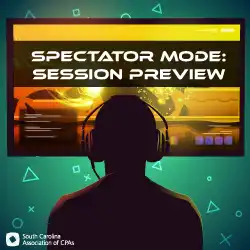Author: J. William Strickland, CPA, J.D.
This article originally appeared in the Summer 2025 issue of the South Carolina CPA Report
The Internal Revenue Code—do your eyes gloss over? Do you need extra-strong reading glasses? A strong drink? Do you want to curse those legislators in Washington, D.C.? Do you ever find it helpful?
I hated reading the IRC when I took a tax research course as an undergraduate student at the University of North Carolina at Chapel Hill. I would read what commentators would say the IRC said to understand the legalese language and how different code sections fit together.
I hated reading the IRC when I was in law school. It took too long to read and prepare for tax class. It was just too many pages.
I still resist picking up my IRC book(s) when confronting a tax issue; BUT, I feel good when I find a solution to the problem I am confronting. I feel GREAT when I understand something I never understood before, because I can use new ideas to advise my clients. After all, that is what I am in business to do: help others pay no more tax than legally required.
When I started my career with Arthur Andersen & Company in 1980, a tax manager gave me this advice: “Read the Internal Revenue Code from cover to cover one time. You will see how it all fits together and will be able to quickly put your finger on the relevant code provisions when you are confronting a tax issue.”
Well, I did read the code during my first year at Arthur Andersen. At first it seemed like reading the King James Bible in its old English vernacular, but as I progressed, it became easier to read and understand (except for Subchapter D, which still gives me fits).
That was then; this is now. Then, the IRC was a mere 1,500-page paperback; today, my paperback copy of the IRC spans more than 5,600 pages across two volumes. Today, I review the table of contents from time to time to refresh my recollection of the IRC structure. From there, I can dive into specific sections to find my answer or develop an idea to tackle the challenge I am confronting.
My favorite tool today is the IRC online at Cornell Law School, which I have bookmarked at law.cornell.edu/uscode/text/26. It usually takes about five or six clicks to reach the section in which I am interested. Also, my computer has three screens, so I can put sections that relate to each other on separate screens and see the correlations. The tool also underlines words and section references so you can click and get a definition or jump to the referenced code section. It’s much easier than laying out several volumes of the CCH Federal Tax Reporter on the library table to put it all together.
This brings me to the titular question: When was the last time you looked at the IRC? Have you ever had a good course in tax research? Have you ever taken CPE that looks to the IRC as its premise? Can you find which section of the IRC speaks to personal holding companies? (Hint – it is Subchapter G, Part II, §542.) Why would I choose this example? Successful S corporations who accumulate and invest earnings could fall afoul of the §1362(d)(3) limitation on passive income and progress to becoming a personal holding company. Who knew?
I would like to encourage my readers to broaden their horizons and gain a better understanding of the IRC. Instead of the ubiquitous CPE offerings on LLCs, S corporations, partnerships, and tax planning overviews for individuals and businesses, I would like to see if South Carolina CPAs would like to have CPE offerings on other parts of the IRC. SCACPA asked me if there was anything I would like to present beyond the ‘standard’ offerings we typically have. I would enjoy tackling almost any part of the IRC (except Subchapter D), but I want it to be interesting and interactive for CPAs who want to learn more about tax law. After all, tax law is the foundation for our tax practices. We need to know more than what tax forms and IRS instructions tell us, especially when our instincts suggest that there must be a better or different way.
Such CPE offerings would also be good for young accountants who want to become tax partners in their CPA firm. In order to develop these courses, we need your input. I went back through the various subchapters of the IRC, and created a list of what might be a smorgasbord from which to choose. When you do your evaluations of CPE courses, I would encourage you to indicate which of these offerings you would like to attend. The courses could be offered on an introductory or an intermediate level, depending on your interests. Explore the list and make your suggestions at
sc.cpa/tax-course-suggestions.
I wish you well in reading the list, which may also refresh your understanding of the IRC structure, since it is laid out in the order in which it appears in the IRC.
Thank you for your feedback, and I look forward to learning what South Carolina CPAs want to learn.
P.S. I still hate reading regulations.

